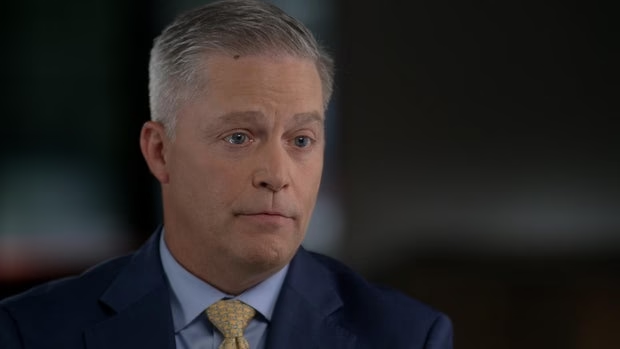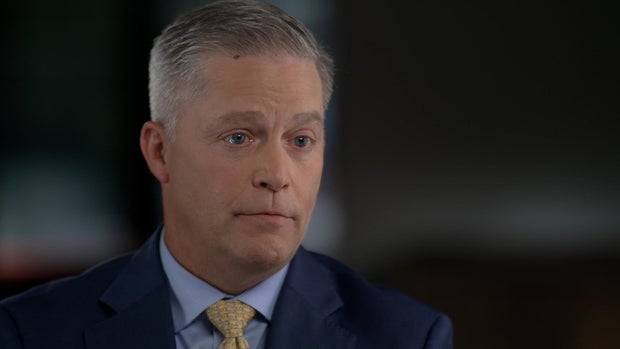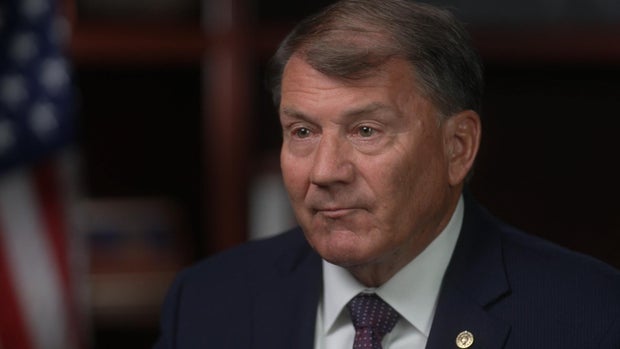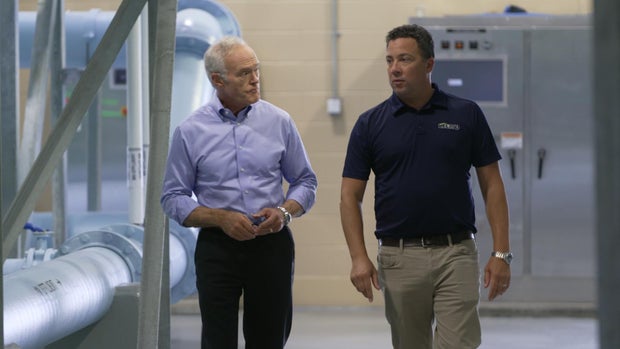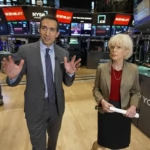Until recently, Tim Haugh was among America’s top spymasters. The four-star general spent 33 years in Air Force Intelligence and rose to lead America’s largest and most advanced intelligence agency. Haugh was also in charge of defending America from computer threats. In his first television interview since retirement, General Haugh is here to warn that China has hacked into U.S. computer networks to an astonishing degree. And he believes he knows why. The surprise, Tim Haugh told us, is that China is targeting not just the U.S. military and industry but also Americans in their homes.
Gen. Tim Haugh: I think initially we were surprised that China would target every American with these capabilities. That goes against every norm of international law. That certainly goes against how the United States military would approach targeting in a crisis or a conflict. That the fact that they would go after basic services as part of their effort that they have identified as unrestricted warfare is unconscionable.
Scott Pelley: And what did they target?
Gen. Tim Haugh: They targeted water. They targeted electrical power infrastructure; transportation are examples of the types of things that were targeted. And in many cases they’re vulnerable.
Multiple intrusions at utilities were discovered in 2023. And China had been on some of their computer networks at least five years.
Scott Pelley: You’re saying that the Chinese today are in American power plants, water treatment plants, other parts of the electrical grid, maybe even hospitals, telecommunications, all of that?
Gen. Tim Haugh: So there is a daily contest that is going on to be able to deny China those accesses. But they are certainly attempting every single day to be able to target telecommunications, to be able to target critical infrastructure, both in the United States and in other countries. And they are doing that to try to ensure that they have an advantage in a crisis or a conflict.
Scott Pelley: Is China preparing for war?
Gen. Tim Haugh: There was no other reason to target those systems. There’s no advantage to be gained economically. There was no foreign intelligence-collection value. The only value would be for use in a crisis or a conflict.
60 Minutes
In 2024, Tim Haugh rose to lead both the National Security Agency, America’s largest spy agency, plus U.S. Cyber Command, the military defense in cyberspace. Haugh took over just as the scope of China’s hacking of utilities was becoming clear in a place no one would have imagined.
Scott Pelley: Is Littleton a major supplier of some kind to the federal government?
Nick Lawler: We are not.
Scott Pelley: Major supplier to a military base?
Nick Lawler: Nope.
Nick Lawler is general manager of the Littleton, Massachusetts electric and water utility. His town has 10,000 residents.
Scott Pelley: Can you think of any reason that China would target your little community?
Nick Lawler: That’s the exact question I had for the FBI when they visited me on that first day, and I still can’t answer that question. No, I can’t think of one reason.
The FBI visited in November 2023 to tell Lawler that China had access to his utility’s computer network. He says the feds told him he was one of 200.
Scott Pelley: How much of all of this is controlled, remotely by computer?
Nick Lawler: All of it.
In his water treatment plant, Lawler showed us tanks of dangerous chemicals that are precisely controlled to deliver clean water.
Scott Pelley: If you had control of these tanks, you’ve got control of Littleton, Massachusetts. You can poison the water.
Nick Lawler: You can poison the water.
But China was caught before it had operational control. With Lawler’s permission, the feds watched what China was doing and what they learned was part of an awakening for American security.
Gen. Tim Haugh: If you are willing to go after a small water provider in Littleton, Massachusetts, what other target is off the list? So, from that perspective, this is a national threat. It’s one that needs to be addressed. But it’s also one that every American should understand, because if they’re willing to go after that small provider that doesn’t have a national security connection, that means every target is on the list.
Scott Pelley: So help me understand, why Littleton?
Gen. Tim Haugh: If we’re involved in something in the Indo-Pacific that is– becoming a challenge between the United States and China, the more that China could get us to focus at home means now our resources are focused in the homeland. That would distract us, distract resources, make it more difficult for us to mobilize in a crisis.
Scott Pelley: Littleton may not be a very large place, but if the Chinese took its water offline, the entire country would be focused on it.
Gen. Tim Haugh: And if there were three to four other examples simultaneously plus an information campaign it could seem much larger than it is, or it could be done in critical places that would have a greater effect.
Other critical places believed to have been targeted by China over years include New York City’s Metropolitan Transportation Authority, 13 gas pipeline operators, the port of Houston and major phone companies.
Sen. Mike Rounds: But here’s the bottom line on this. They have gotten to be very, very good at cyber operations.
Mike Rounds thinks he knows why China is doing this.
60 Minutes
The Republican senator of South Dakota is chair of the Armed Services Cybersecurity Subcommittee. He believes China intends to deter the U.S. from standing up in a fight by hacking our most sensitive industries
Sen. Mike Rounds: But all it takes is a blip on the financial markets to delay certain trades by just milliseconds, to put the market into an entirely different attitude about the security and the soundness of being able to make those transactions happen.
Scott Pelley: You’re talking about causing chaos on Wall Street.
Sen. Mike Rounds: Threatening to be able to cause chaos on Wall Street would be something that they would love to do.
Scott Pelley: And turning the lights on and off.
Sen. Mike Rounds: Most certainly. Or to start out with, whether or not you can get an airline reservation. And so those are areas that they would love to– just so that when the time comes, in my opinion, they can look at it and simply say, “We know where you’re at. Don’t mess with us. We’re capable of causing real problems for you long term.”
China is causing those problems by exploiting vulnerabilities in network equipment. In Littleton, Massachusetts, China found a weakness in a network firewall. That’s not unusual when software vulnerabilities go unpatched or when out-of-date equipment is no longer supported with security updates. Once inside, China did not install malware which could be a red flag. Instead, it stole log-in credentials and masqueraded as a legitimate employee.
Gen. Tim Haugh: They are just gaining access to that system and then attempting to lay dormant. They’re not spending more time collecting intelligence or taking other activities.
Scott Pelley: It’s there if they need it later.
Gen. Tim Haugh: Exactly.
Scott Pelley: Do we even know how extensively the Chinese are into our systems?
Gen. Tim Haugh: I don’t think we have a perfect knowledge of that.
Scott Pelley: How many Chinese attacks are there on U.S. systems in a day?
Gen. Tim Haugh: I would exp– expect that automated activity are happening at scans, at the– the m– millions of devices throughout every single day.
China denies the hacking. The White House told us it is working to “assess exposure and mitigate the damage.” In Littleton, the damage forced Nick Lawler to completely rebuild his network, at a cost of more than $50,000.
60 Minutes
Gen. Tim Haugh: It is much more consuming to try to get somebody out of a network than to deny them access, which is why it’s so critically important that we get the basics right in our critical infrastructure and in these substantive networks so that we aren’t expending more resource to try to root them out.
Scott Pelley: Tell me we’re good at this.
Gen. Tim Haugh: We are definitely good at this.
Scott Pelley: Really?
Gen. Tim Haugh: But the scale is a challenge.
Very few understood the scale or the challenge as well as Gen. Haugh. In the first Trump administration he was promoted to two star general, then three star. But later, with a fourth star, he led the National Security Agency for only a little over a year.
Gen. Tim Haugh: I got a phone call from a senior official in the Department of Defense that told me that the President had made a decision to remove me.
He was fired, in April, after a far-right activist named Laura Loomer met with the president. Online she explained that Haugh was “disloyal” and had been “referred for firing.” The evidence she pointed to, publicly, was Haugh’s appointment by President Biden. She called Haugh’s firing “a blessing for the American people.”
Scott Pelley: That has got to be galling–after your career.
Gen. Tim Haugh: I– I know in my heart that every day I wanted to achieve the things for our nation that would make us more secure and make every American safe, and that continued to my last day of service. So– from that perspective– it– it certainly was impactful to me and my family. But at the end of the day, it’s about our nation and it’s about our nation’s security.
Scott Pelley: You’re sitting there with four stars on your shoulder, you have spent your entire life in the Air Force, and you’ve been accused of being disloyal. Your reaction is what?
Gen. Tim Haugh: That every day I woke up committed to our national security and to meeting the expectations of the President.
Scott Pelley: Not disloyal?
Gen. Tim Haugh: Absolutely not.
The White House did not answer our questions about Haugh’s firing from the National Security Agency. Later, Haugh retired from the Air Force.
Sen. Mike Rounds: We do not have enough of these types of leaders, and a loss of any one of them without strong justification is disappointing.
A new acting head of the National Security Agency was appointed but the week after the firing, Republican Mike Rounds, chair of the Senate’s Cybersecurity Subcommittee, saw Haugh’s sudden termination this way.
Sen. Mike Rounds: The departure of General Haugh is a loss for our nation but will be a tremendous gain for any private or public entity where he decides to lend his expertise and leadership. I wish him Godspeed. That said, as our adversaries watch this hearing, it will be clear that no matter the scenario, our cyber mission forces are ready.
Gen. Tim Haugh: The National Security Agency and U.S. Cyber Command are consequential organizations. The second I was no longer the leader, focus shifts to them. They have consequential missions to do and for my family, it shifts to, how do we serve in different ways.
Today, Tim Haugh serves by teaching at Yale, and consulting private industry, but sidelined in government, as China expands its aggressive hacking, spying and theft of intellectual property.
Scott Pelley: There have been resignations and firings of other people focused on America’s cyber defense. What does that mean for our national security?
Gen. Tim Haugh: Our overall capacity is getting smaller while we know China’s continues to grow. There is still immense capability in the U.S. government, and now it will be up to the administration to be able to be able to use that and build partnerships with industry to be able to ensure that we’re countering these threats.
Scott Pelley: If the United States does not dominate in this space, what is at stake?
Gen. Tim Haugh: First, I’m always confident in our nation. But if we don’t dominate in this space, China gains advantage with the ability to continue to steal intellectual property, which impacts our economy. They could gain increased intelligence collection, which would help them every day and also in a crisis in conflict, and they could preposition in critical networks, both in the United States and with allies and partners that could give them advantage in a crisis. We can’t let that happen.
Produced by Aaron Weisz. Associate producer, Ian Flickinger. Broadcast associate, Michelle Karim. Edited by April Wilson.


